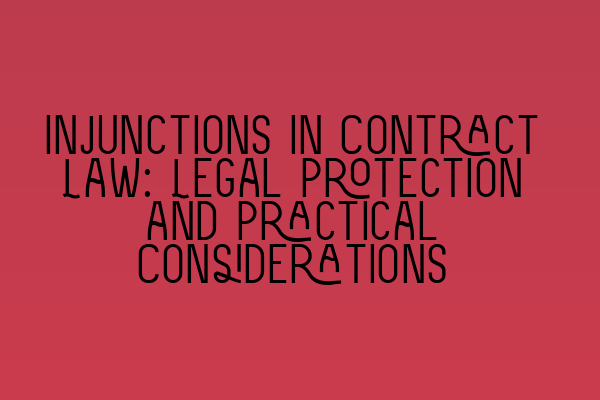Injunctions in Contract Law: Legal Protection and Practical Considerations
When it comes to contract law, parties often rely on written agreements to govern their rights and obligations. However, there are situations where a party may need urgent legal protection to prevent the other party from breaching the contract or causing irreparable harm. In such cases, injunctions play a crucial role in providing the necessary relief. This article explores the concept of injunctions in contract law, highlighting their legal protection and practical considerations.
Understanding Injunctions in Contract Law
An injunction is a court order that requires a party to do or refrain from doing a particular act. In the context of contract law, an injunction may be sought to enforce specific performance of the contract or to restrain a party from breaching their contractual obligations.
There are two main types of injunctions that can be granted in contract cases:
- Prohibitory injunctions: These injunctions are used to restrain a party from taking certain actions that would breach the contract or cause harm to the other party. For example, if Party A has agreed not to disclose confidential information to third parties, Party B may seek a prohibitory injunction to prevent Party A from doing so.
- Mandatory injunctions: These injunctions are used to require a party to take positive action to fulfill their contractual obligations. For example, if Party A has failed to deliver goods as agreed, Party B may seek a mandatory injunction to compel Party A to deliver the goods.
The Legal Protection Offered by Injunctions
Injunctions can provide significant legal protection in contract law cases. By obtaining an injunction, a party can effectively prevent the other party from breaching the contract or causing irreparable harm. This legal remedy allows the aggrieved party to maintain the status quo and preserve their rights until the dispute is resolved through litigation or alternative dispute resolution methods.
One of the main advantages of injunctions is that they are flexible and can be tailored to suit the specific circumstances of the case. Courts have wide discretion in deciding whether to grant an injunction and will consider factors such as the balance of convenience, the availability of alternative remedies, and the likelihood of success at trial. This flexibility ensures that parties can obtain the most appropriate form of relief based on their individual circumstances.
Furthermore, injunctions can be granted on an interim or final basis. Interim injunctions are temporary measures that provide immediate relief until the full trial can be heard. Final injunctions, on the other hand, are permanent and are issued after a full trial on the merits of the case.
Practical Considerations in Seeking an Injunction
While injunctions can offer significant legal protection, seeking an injunction in contract law cases requires careful consideration of several factors:
- Urgency: Injunctions are typically sought when there is an urgent need for immediate relief. Parties must demonstrate to the court that there is a risk of irreparable harm or a breach of contract that cannot be adequately compensated through monetary damages.
- Evidence: Parties seeking an injunction must provide clear and convincing evidence to support their case. This may include documentary evidence, witness statements, and legal arguments. The strength of the evidence will play a crucial role in the court’s decision to grant or deny an injunction.
- Alternative remedies: Courts will consider whether alternative remedies, such as damages, are sufficient to address the harm suffered by the aggrieved party. If monetary damages can adequately compensate the party, the court may be less inclined to grant an injunction.
It is essential to seek professional legal advice when considering an injunction in contract law cases. An experienced solicitor can assess the merits of your case, gather the necessary evidence, and guide you through the complex legal process.
For more information on legal topics related to contract law and the legal profession, check out these related articles:
- Mentorship for Aspiring Solicitors: Nurturing Talent in the Legal Field
- Legal Challenges and Pitfalls: Navigating the Complexities of the Legal System
- The GDL (Graduate Diploma in Law): A Pathway to Becoming a Solicitor
- Mastering the Solicitor’s Path: Prepare for the Journey Ahead
- The Benefits of Becoming a Solicitor: A Rewarding Career
In conclusion, injunctions play a vital role in contract law by providing legal protection and practical remedies to parties in need of urgent relief. Whether you are facing a breach of contract or seeking to ensure specific performance, obtaining an injunction can help safeguard your rights and prevent irreparable harm. However, it is crucial to consult with a qualified solicitor who can guide you through the complexities of seeking an injunction in contract law cases.
